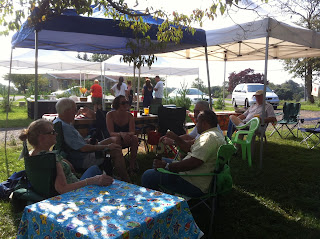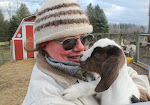At market I get asked, "Are your chickens free-range?" at least once a week by an egg customer.
"Yes, sometimes a little too free-ranging," I respond.
 While I like to keep my poultry as contained as possible while still keeping them on pasture (electric poultry netting, large fenced paddocks, Hoop Coops), there's always an errant hen or two who absolutely insists on pushing their limits, much to my neighbors' dismay.
While I like to keep my poultry as contained as possible while still keeping them on pasture (electric poultry netting, large fenced paddocks, Hoop Coops), there's always an errant hen or two who absolutely insists on pushing their limits, much to my neighbors' dismay.Unfortunately, as I walked out toward the pasture this morning I could see the 'feather bomb' before reaching the body. Something had taken out one of the little red hens during the night.
On my poultry advertising at farmers markets, I list "Predator Friendly" as one of my selling points. Occasionally, someone asks about it. It simply means that I do not make it a point of killing natural predators such as hawks, owls, raccoons, opossums, weasels, minks, skunks, etc., as many of my neighbors and fellow market vendors do. Despite being a federal offense to maim or kill a bird-of-prey, increasingly I've heard many of my fellow farmers brag about killing raptors who are biting into their bottom line as well as their birds.
If I look and listen long enough, I often realize that they create an imbalance on their farm which leads to excessive predation. For instance, free-feeding with large hoppers of food, while it may be a convenience--especially to those who have increased their flocks to several hundred birds--is also a huge draw for vermin such as mice and rats. Similarly, improperly storing feed will support a larger rodent population than normal.
When the rodent population explodes, that's tantamount to ringing the dinner bell for those higher up on the food chain. And that's where the problems begin.
If you were a predator, which would you rather eat---a rinky-dinky little mouse or a nice, big, fat, juicy hen? Forget those little nuggets, they're going to go after the bigger piece of protein, which I might add, are much easier to catch.
"I've shot six hawks this season and they're still harassing my birds," lamented a local grower whose flocks have increased in size along with the number of farmers markets he attends. So much for sustainability....

A few months ago I lost a laying hen inside the fence to a raccoon. How did I know it was a raccoon? Through one of the sites that help chicken enthusiasts figure out what's pilfering their poultry like this one.
Instead of staying up half the night with a flashlight duct taped to the barrel of a shot gun, I simply put my Great Pyrenees in with the layers for a few days. The raccoon never returned.
But last night's victim still had her head intact with her guts ripped out instead meaning chances were it was either an opossum or a skunk.
When it comes to predator prevention on the farm, nothing beats a Livestock Guardian Dog. Mine are worth their weight in gold several times over and they're big dogs. But there are other ways to deter predators such as roosters and adequate shelter. One poultry farmer I know swears by his Nite Guard, a blinking red light and others opt for folk remedies such as dog hair, human hair and even human urine.
 But in reality, sometimes Mother Nature wins against Domestication and in this case there's only one thing left to do--salvage what's left either as compost or in the case of the errant laying hen who fell victim to a marauder last night, a treat for the pigs. Nothing ever goes to waste. By the way, the entire carcass was completely gone--feathers, feet & all--in less than five minutes. Pigs are the ultimate in body disposal. Kind of makes you wonder why Tony Soprano and his gang always hung out in the sausage shop.....
But in reality, sometimes Mother Nature wins against Domestication and in this case there's only one thing left to do--salvage what's left either as compost or in the case of the errant laying hen who fell victim to a marauder last night, a treat for the pigs. Nothing ever goes to waste. By the way, the entire carcass was completely gone--feathers, feet & all--in less than five minutes. Pigs are the ultimate in body disposal. Kind of makes you wonder why Tony Soprano and his gang always hung out in the sausage shop.....
























































